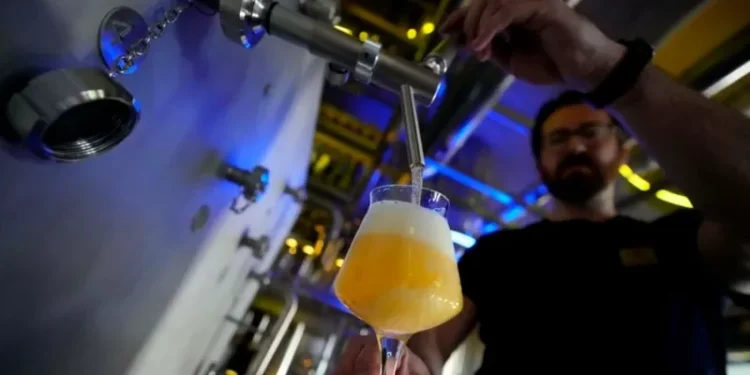MUNICH — The world’s oldest brewery, Weihenstephan, has been producing some of the finest beers for over a thousand years. But what may come as a surprise is that the head brewmaster, Tobias Zollo, actually enjoys alcohol-free beer.
While Zollo admits that he obviously prefers real beer, he has developed a fondness for alcohol-free beer, especially when he’s working or having lunch. It has the same great taste as regular beer, but with fewer calories, thanks to the brewery’s unique process of evaporating the alcohol.
“It’s not every day that you can indulge in drinking beer. Unfortunately,” Zollo joked, as we chatted at the Bavarian state brewery in the charming town of Freising, just 30 kilometers north of Munich.
But Zollo is not alone in his appreciation for this sober beverage. In recent years, alcohol-free beer has been gaining popularity as beer consumption has decreased.
At Weihenstephan, where beer has been brewed since 1040 by Benedictine monks, non-alcoholic wheat beer and lager now make up 10% of their total volume. This increase over the past few years, since they started producing alcohol-free drinks in the 1990s, reflects the trend in the rest of Germany’s beer industry.
“As a brewmaster, it’s unfortunate to say that people are drinking less beer. But as long as there is an alternative to enjoy the crisp and fresh taste of a typical Weihenstephan beer, but without the alcohol, we are happy to offer it,” Zollo shared.
Even at Oktoberfest, the world’s most famous beer festival, alcohol-free beer has found its place on the menu.
Out of the 18 large tents at the festival, only two do not serve alcohol-free beer. For the remaining 16 days of the celebration, festival-goers can enjoy this sober option, which costs the same as an alcoholic beer, ranging from 13.60 to 15.30 euros ($15.12 to $17.01) for a 1-liter mug. Not only does it save you from a hangover the next day, but it also allows you to fully experience the festivities without the effects of alcohol.
“For those who don’t enjoy drinking alcohol or want to fully enjoy Oktoberfest without it, alcohol-free beer is a great option,” said Mikael Caselitz, a 24-year-old local from Munich, as we sat inside one of the tents on Saturday. “Sometimes people think that they can only have fun with alcohol, but that’s not true. You can have just as much fun without it.”
He added, “And if you choose to drink alcohol-free beer, no one will judge you for it.”
This year, Munich saw the first-ever opening of an alcohol-free beer garden, “Die Null” (which means “the zero” in German). Located near the city’s main train station, it served a variety of non-alcoholic beers, mocktails, and other alcohol-free drinks during the summer. Although it is scheduled to close a few days before Oktoberfest begins, it is a testament to the growing demand for alcohol-free options.
According to Walter König, managing director of the Society of Hop Research located north of Munich, researchers have had to develop special hops varieties specifically for alcohol-free beer. When using the typical hops for regular beer, the distinct aroma gets lost during the process of reducing the alcohol content.
But for customers, what matters most is the taste, not the process. As König shared, “They just want to make sure that the alcohol-free beer they are drinking is as good as the traditional beers with alcohol.”
In a world where alcohol is often associated with socializing and having a good time, it’s refreshing to see that there are alternatives that cater to those who don’t wish to drink alcohol. Whether it’s for personal preference, health reasons, or just a desire to enjoy a crisp and refreshing drink without any intoxicating effects, alcohol-free beer has become a welcome addition to the beer industry.
So, next time you visit Munich or any other German city, don’t be afraid to try out the alcohol-free beer. Who knows, you may be pleasantly surprised by the taste and also save yourself from a hangover the next day. And as Tobias Zollo would say, “Even though it’s not possible to drink beer every day, fortunately, we can now







